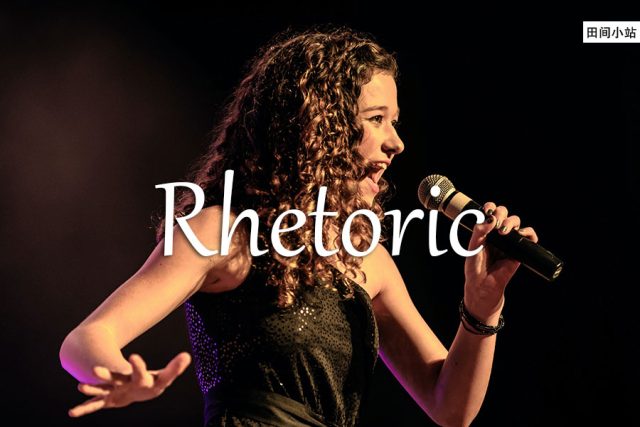本文经授权转载自微信公众号:田间小站

TOEFL SAT TEM8 GMAT GRE
外刊例句
- An imminent free-trade deal between Japan and the European Union will add substance to her rhetoric.
日本和欧盟之间即将达成的自由贸易协定将为她的雄辩言辞提供实据。
——《经济学人》 - Pro-Palestinian students say that they are speaking up for an oppressed people, but critics say that their rhetoric is deeply offensive.
亲巴勒斯坦的学生说,他们是在为受压迫的人民发声,但批评者表示,他们的煽动性语言极具攻击性。
——《纽约时报》
基本释义
[noun] the art of effective or persuasive speaking or writing, especially the use of figures of speech and other compositional techniques
[名词] 修辞(学)
深入解读
Rhetoric 一词源自希腊语 rhētorikētekhnē (演说家的艺术),14世纪初经古法语 retorike, rethorique (修辞、修辞学)或者直接由拉丁语 rhetorice 进入英语。
相应也是用来表示“修辞(学)”或者“雄辩(术)”,常作正式用语使用,即有效或有说服力的演讲或写作艺术,尤指修辞手法以及其他创作技巧的运用,比如:
- 西塞罗是雄辩大师。
Cicero was a master of rhetoric.
从这个概念出发, rhetoric 进而用来表示“雄辩言辞、煽动性语言”,即旨在令受众信服或印象深刻的言辞,比如:
- 她巧言善辩,说得我服服帖帖,把全部储蓄都捐给了慈善机构。
I was swayed by her rhetoric into donating all my savings to the charity.
但在现实生活中,很多听起来言之有理的(plausible)雄辩之辞只不过是糊弄人的花言巧语。因而 rhetoric 也常用作贬义词引申表示“花言巧语、浮夸之词、华而不实的言语”,即内容缺乏诚意或意义的雄辩言辞,比如:
- 需要的是立刻采取行动,而不是说些华而不实的空话。
What is required is immediate action, not rhetoric. - 他们是否能实践竞选时发表的冠冕堂皇之词尚待日后分晓。
Whether they can live up to their campaign rhetoric remains to be seen.
值得注意的是, rhetoric 一词中的字母 h 不发音,参见首图下方的音标。
名人名言
Rhetoric is the art of ruling the minds of men.
修辞学是一门驾驭人心的艺术。
出自古希腊著名哲学家柏拉图(Plato)。
同近义词
- oratory: the art or practice of formal speaking in public
- eloquence: fluent or persuasive speaking or writing
- diction: the choice and use of words and phrases in speech or writing
